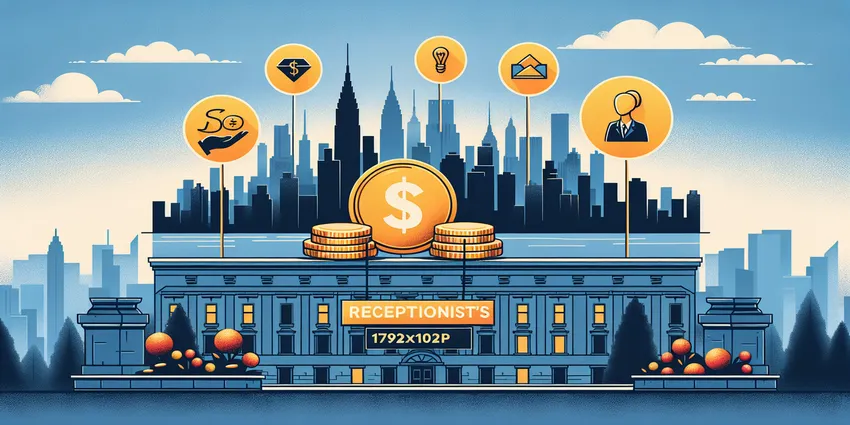New York City Salary Guide for Receptionist: Key Takeaways
- Receptionists in NYC earn an average hourly wage of $21.54, about 23% higher than the national average.
- Annual salaries for receptionists in NYC average around $44,803, with entry-level roles ranging from $36,573 to 45,945.
- Tipping is uncommon but bonuses or tip-sharing may occur in luxury hospitality settings.
- Common benefits include health insurance, paid time off, retirement plans, transportation perks, and employee discounts.
Receptionists in New York City enjoy competitive pay compared to the national average.
This salary guide breaks down average wages, tipping norms, and typical employee benefits.
1. Average Pay for Receptionists in New York City
Receptionists across New York City earn an average hourly wage of approximately $21.54, which is significantly above the U.S. average for this role. Learn more about receptionist salary on OysterLink to understand the wage landscape.
This hourly rate translates to an annual salary around $44,803 for full-time positions, showcasing the city's higher cost of living and demand for skilled front-desk professionals.
Entry-level receptionists typically make between $36,573 and 45,945 annually, with the midpoint being near $40,784.
In Manhattan, wages tend to be slightly higher with receptionists earning approximately $22.50 per hour or about $46,800 yearly.
Factors Influencing Receptionist Salary in NYC
- Location within NYC: Manhattan generally offers higher wages than outer boroughs.
- Experience: More skilled and experienced receptionists command better pay.
- Industry: Receptionists in medical, legal, and high-end hospitality sectors often earn more.
- Employer size: Larger companies may provide higher salaries and better benefits.
2. Tipping and Bonus Structure for NYC Receptionists
Unlike roles in the hospitality or food service industries, tipping is generally uncommon for receptionists in New York City.
Most receptionists earn their income through hourly wages or salaries rather than tips.
However, in select high-end hospitality venues such as luxury hotels and upscale restaurants, receptionists might receive bonuses or be included in tip-sharing arrangements alongside other frontline staff.
These tip shares or performance bonuses act as additional incentives but are not a standard form of compensation.
Employers looking to hire the best talent might find the how to hire a receptionist guide particularly useful for attracting qualified candidates.
3. Benefits for Receptionists Working in New York City
Alongside competitive wages, many employers offer receptionists a comprehensive benefits package to attract and retain talent.
Common benefits include medical, dental, and vision insurance as part of health and wellness coverage.
Paid time off (PTO) is typical, allowing employees to take vacation, personal, or sick leave while still earning pay.
Retirement savings plans such as a 401(k) or similar programs help receptionists plan for the future.
Transportation benefits are also common and may include subsidies for public transit costs or parking expenses, an important consideration given NYC’s reliance on public transportation.
Additionally, some employers provide employee discounts on company products or services as an added perk.
Importance of Benefits for Receptionists in NYC
The high cost of living in New York City makes benefits especially valuable, often offsetting some expenses beyond base salary.
Health coverage and transportation benefits, in particular, can greatly improve overall job satisfaction and financial stability for receptionists.
Employers can benefit from reading about perks in restaurant job postings to better promote their offers to candidates.
4. Career Growth and Salary Progression for NYC Receptionists
Receptionists in New York City can leverage experience and additional skills to advance their careers and increase earnings.
Specializing in industries like healthcare, law, or corporate services may lead to higher pay and opportunities for advancement into administrative assistant or office management roles.
Developing proficiency with office technology, customer service, and multilingual communication are assets that improve employability and salary prospects.
To prepare for interviews or learn how to advance, receptionists can visit receptionist interview questions for helpful tips.
5. Resources for Receptionists and Employers in New York City
For authoritative information on labor standards, wage laws, and worker rights, the following government resources are invaluable:
- New York State Department of Labor - Provides state-specific wage and employment information.
- U.S. Department of Labor Wage and Hour Division - Offers federal wage guidelines and labor laws.
- NYC Office of Labor Policy & Standards - Covers local labor standards and compliance resources.
Employers can also learn about recruitment costs and strategies by reading cost of hiring employees and strategies.
New York City Salary Guide for Receptionist: Conclusion
Receptionists in New York City enjoy higher salaries compared to the national average, reflecting the city’s competitive job market and living costs.
While tipping is uncommon, some luxury hospitality roles provide bonuses or tip sharing.
Comprehensive benefits including health insurance, paid leave, retirement plans, and transportation perks are common and crucial for employee well-being.
Understanding this salary landscape and available benefits helps job seekers and employers navigate expectations and opportunities in NYC’s vibrant market.
For employers interested in improving their hiring process, the how to hire a receptionist resource will prove helpful in attracting and retaining talent.









Loading comments...